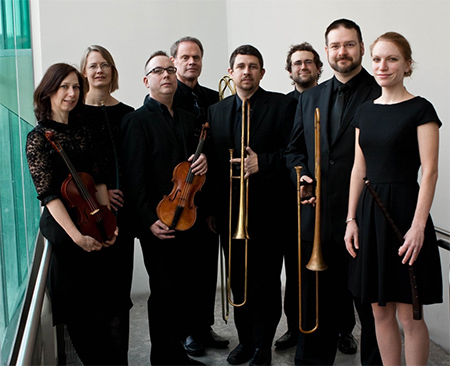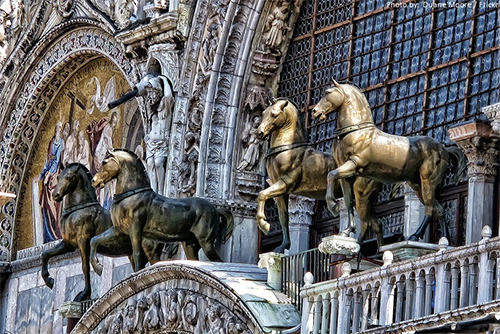by Daniel Hathaway

Probably more than a few audience members attending Apollo’s Fire’s “Echoes of Venice” performances this week were first introduced to Gabrieli’s opulent music through a famous old recording by organist E. Power Biggs, the Gregg Smith Singers, the Texas Boys Choir, and the Edward Tarr Brass Ensemble — who performed on modern trumpets and trombones.
In four concerts this week, Apollo’s Fire and Apollo’s Singers will join the Dark Horse Consort, a Boston-based ensemble comprising period strings, cornetti, and sackbuts, to recreate the sounds that might actually have bounced back and forth under the seven domes of St. Mark’s in 1615. That was the year Gabrieli published his 14-part motet for three choirs, In Ecclesiis.
The Consort, named after the four bronze horses that reign over the façade of San Marco — replacements for originals that were pillaged from Constantinople in 1204 during the Fourth Crusade — will be featured in the first and last segments of the six-part program. Those include liturgical music by Gabrieli, Monteverdi, and Giovanni Battista Riccio.
In between, Jeannette Sorrell has chosen works by Johann Rosenmüller and Michael Praetorius for “Echoes of Lamentation,” Monteverdi madrigals for “Echoes of Love,” and vocal pieces by Marini and Monteverdi for “Echoes of Mysticism.” Works by Praetorius and Heinrich Schütz represent “Echoes from the North,” reflecting German composers who ventured south and took the Venetian style home with them.
Dark Horse regularly includes violinists Julie Andrijeski and Robert Mealy, cornettists Alex Opsahl and Kiri Tollaksen, sackbut players Greg Ingles, Mack Ramsey, and Erik Schmalz, and keyboardist Ian Pritchard, but can expand as repertoire demands. “We’re lucky to have two of the best cornettists in North America,” founder Greg Ingles said in a telephone conversation.
Ingles graduated from Oberlin in 1995 with a degree in trombone, but didn’t get bit by the historical performance bug until graduate school. “Oberlin wasn’t doing any early brass when I was there. So I didn’t get turned on to period performance until I got to Stony Brook, where Arthur Haas had a Baroque ensemble with strings, winds, singers, and continuo. By my second year, I started playing with the Philadelphia period wind band Piffaro.”

Other forthcoming projects involve concerts with Boston’s Blue Heron and Back Bay Chorale, a performance of Heinrich Schütz’s Musikalisches Exequien with Tenet in New York’s St. Luke’s in the Fields, and more Monteverdi Vespers concerts in Madison.
Ingles said that the Apollo’s Fire repertoire was chosen by Jeannette Sorrell in consultation with Italian-born musicologist Marica Tacconi. “It’s based on the use of echoes in Italian music of the period” — the subject of Tacconi’s recent book. “Most of the pieces on the program include echo components, and they make up some of the earliest gems of Western classical music.”
One element of the repertoire that sometimes goes unnoticed is that composers were specific about what instruments they required. “Gabrieli and Monteverdi listed instrumentation in the part books, and these multi-voice sonatas, which include as many as 22 parts, represent some of the earliest orchestrated music.”
Ingles added that it’s possible to play directly from facsimiles of the original partbooks, especially in the case of Riccio’s echo canzona for two cornetti. “It’s easy to read, and beautiful music. It’s definitely a different experience playing directly from a source than from an edition.”
Asked what potential attendees can look forward to this weekend, Greg Ingles said, “This is some of the most beautiful, as well as the most earnest and sincere music you’ll ever hear.” He’s also fascinated by how its style subtly changed when Schütz brought it back to Germany after his three-year sojourn in Venice from 1609 to 1612. “He takes the idea of multiple-choir music and makes it more Lutheran, more humble, more populist.”
I signed off with a final question: though Dark Horse won’t be using them, were there trumpets in Venice during this period? “The prelude to Monteverdi’s Orfeo calls for five of them,” he said. “Eric Schmalz and I play with Piffaro, which just bought two buzins — long, straight trumpets we recently used in a concert of Burgundian music with shawms. I’m still trying to convince my colleagues to buy more so we can do the Monteverdi fanfare authentically.”
Published on ClevelandClassical.com October 15, 2019.
Click here for a printable copy of this article



